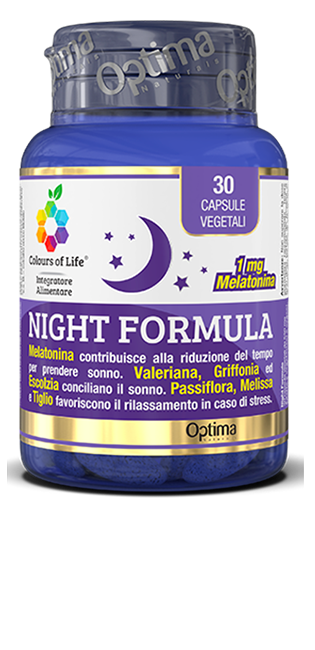BLOG
Sleep disorders: help from nature

The right sleep
A good quality sleep, effective and regenerating for the body, is obtained by sleeping the right hours for your body and respecting some useful behaviours. The right hours vary from person to person, each of us has his or her own metabolism. Generally speaking, adults get between 6 and 8 hours of restful sleep. The important thing, however, is to make sure you get a good night's sleep, to respect the body's sleep-wake rhythm, also known as the circadian rhythm, so that you don't end up suffering from what are known as 'sleep disorders'.
Sleep disorders
Sleep disorders are different. Here the main ones:
- sleep apnoea, which is one of the respiratory sleep disorders (RDS) that also causes snoring. Respiratory sleep disorders should not be neglected because they can cause cardiovascular and respiratory disorders;
- insomnia which manifests itself in sleep disturbed by difficulty in falling asleep, frequent awakenings, restless sleep which fatigues the organism;
- narcolepsy, which presents with intense sleep attacks throughout the day and indicates an alteration in the brain's sleep-wake rhythm.
There are also many other disorders that occur depending on age and lifestyle. All sleep disorders can be diagnosed with an examination called polysomnography.
Tips for sleeping well
Nutrition
In order to improve sleep quality, meal times are important, especially dinner time, which should be at least 3 hours before bedtime. Foods that can disturb sleep are exciting foods such as tea and coffee, alcohol and sweets, which should always be avoided at dinner, sausages and spicy foods, and fried foods. Food combinations that require long digestion are also important: milk and carbohydrates, cheese and legumes, and choosing only one type of protein per meal (no meat + cheese or fish + eggs).
Lifestyle and useful habits
In your daily lifestyle it is important to adopt healthy habits:
- switch off electronic devices at least one hour before going to bed,
- exercise but before dinner time and not afterwards,
- introduce stress-relieving habits before bed such as meditation, listening to relaxing music,
- choose to use soft lighting as bedtime approaches,
- take care of the bedroom: choose a suitable mattress and pillow, create a relaxing environment with soft colours and do not introduce electronic devices.
Nature's help for sleep disorders
Melatonin
The first natural aid is melatonin, a hormone present in the body which, if lacking, can be supplemented. Its production by the body depends on exposure to sunlight, but it is important to know that it decreases with age, certain disorders and an irregular lifestyle. This is why in some cases it may be necessary to supplement it. If you need more than 1 mg a day, you need a doctor's prescription.
Valerian, Eschscholzia, Griffonia to help you sleep
Valerian is a herb with analgesic, hypotensive and calming properties. It helps to calm states of anxiety and, in particular, has a sedative effect on the central nervous system. According to one study, reported at the end of this article, it affects the quality of sleep.
Escholzia has antispasmodic, relaxing and pain-relieving properties. It is particularly useful when sleep is disturbed by pain (headaches, stomachaches) or muscle cramps as it acts as a calming agent for the muscular system.
Valerian and Eschscholzia have a sedative and calming effect, helping to reduce the time it takes to fall asleep and maintain a prolonged sleep without waking up at night.
Griffonia balances levels of the feel-good hormone serotonin, which helps to relieve anxiety and stress and improve sleep quality by promoting deep sleep.
Passion flower, Lemon balm and Linden to promote relaxation in cases of stress
Passionflower has sedative properties and helps to relieve stress, tension, agitation and nervousness. It also has spasmolytic properties in cases of digestive disorders caused by stress and helps relieve menopausal complaints. It also has hypotensive properties.
Lemon balm helps improve mood, concentration and memory. It relieves stress by promoting relaxation of the entire psychophysical system and restful sleep. It may also promote gastrointestinal functions.
Passionflower and lemon balm have a calming and anxiety-relieving effect, aiding sleep in cases of stress or anxiety.
Linden has relaxing properties, helps to relieve anxiety and promotes sleep. It can help in cases of tachycardia and, thanks to its expectorant and mucolytic properties, relieve coughs.
Sources and insights
- Pubmed, Aqueous extract of valerian root (Valeriana officinalis L.) improves sleep quality in man
- Pubmed, Anxiolytic-like effect of Griffonia simplicifolia Baill. seed extract in rats
- MDPI, Anti-Stress Effects of Lemon Balm-Containing Foods
The advice is for information only and should not replace medical assistance. Please consult a doctor or health care professional before trying any remedies.
NIGHT FORMULA









 Optima Naturals S.r.l. ® Via Sempione 124, 21029 Vergiate (VA)
Optima Naturals S.r.l. ® Via Sempione 124, 21029 Vergiate (VA)